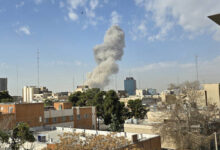Babafemi Ojudu, Adventures of a Guerilla Journalist: A review

By TOYIN FALOLA
While going through this masterpiece capturing the experiences and travails of an older advocate for truth and justice, I could not help but reminisce deeply on many unspoken questions for Senator Babafemi Ojudu in my thoughts. I could well imagine his predicament and those who believed in the cause under the rule of hardliner military men who ruled with ‘iron fists.’ After many years since their ordeal in the quest for undiluted journalism, one cannot but ask how they eluded death to stay alive, brandishing the pen in their hands with a junta breathing down their neck.

This unspoken question of survival, amongst others, is what Ojudu, once again, through the pen, seeks to answer in his engaging book. This memoir sheds light on the dire consequences of standing by the truth in an era where the truth could cost its adherents their freedom and even their lives. It is a story of defiance and action over sheer spectatorship. This historical work is enough reason why Nigerians today should extend gratitude to those who chose defiance and acted to their peril.
This is not just a tale of daring escapes across cities and major towns in Nigeria; it is a collection of humanity’s stand against a well-organized force with resources, portraying the need to identify the book with “guerilla warfare.” In this case, it was a battle of pen against the guns and boots of dictators. For anyone curious about the actual cost of press freedom in Nigeria, Adventures of a Guerrilla Journalist is a master class in courage, conviction, and the ink-stained price of resistance.
In this book, Ojudu pens emotional recollections of how the nomenclature came to be; his description in the prologue depicts a simile survival scheme popular amongst government “spooks.”Use of codes, obscured manners of communication, irregular meeting places, and schedules, amongst others, to beat the vigilance of men and officers of military intelligence. Even though the Chairman, as addressed by his circle, might have laughed over the escapades years after, it is not false that those moments were not of comfort.
The author’s use of quotes befitting each character, speaks of the dire nature of the job. In one chapter, Ojuduunequivocally employs the words of W. James Johnson, where he reaffirms and acknowledges the undeniable truth that journalists are very much aware of the dangers lurking around their chosen profession but forge ahead gallantly, owing to what he describes as “a deep sense of idealism that leads them to takerisks through utmost dedication to work.” The book, in an engaging manner, throughout its chapters conveyed the quest to report nothing but the truth with the masses in mind. It is an excellent service to Nigerians at a point where the truth could be easily diluted and altered before the onlooker. At one point, it was as though the author and his army of pen warriors agreed that they owed it to the coming generations to provide a buffer-like platform for the successive democracy that came to be. This was captured effortlessly in the attempts to ponder and ask questions about the nation’s state. At some point in the history of Nigeria, university graduates were being fed sumptuous meals in schools; the country could boast of its mighty pyramid of farm crops from the North, robust exportation of cash crops, and most importantly, during these periods, foreign investors eyed the country for business opportunities.
As the author puts it within the lines of his books, the “How did we get here?” and “Who got us here?” questionsshowed a deep-seated melancholic reflection that the younger generation may not understand. Who else but a frontline in the quest for the truth could recount the good old days, giving undiluted accounts of probable missteps and excesses of military regimes that often seek coverups for their actions during this stone-aged-like period?
Recounting interactions and tales of activism, readers will learnthe circumstances of establishing the Committee for the Defense of Human Rights (CDHR). The eventual decision to form an organized body to fight for human rights extensively explains, amongst other things, the quests of Ojudu and others to pursue a noble cause genuinely. Even in the shadows, the group continues to act as a thorn in the path of the government and its machinery,fighting for a just cause at a personal disadvantage. Funny enough, the committee gained so much momentum that individuals sought out its leadership to settle personal squabbles.
Away from government and politics, the book, on more than a single account, discussed salient societal issues in the country. The first is the disapproval of a significant mention in the book of the dogmatic consumerism that Nigerians and others have embraced. This was during the hysteric moment that came with the release of the Apple computers into the market. Despite owning one and getting to use it effortlessly, Dr Beko Kuti, a close confidante of the author, never ceased to express his distaste for absolute consumerism as seen in the nation at that point. In the same vein, the infamous trip to Allen Avenue that night not only depicts the struggles of young women who are victims of circumstances but also of the government in ensuring that the lives of persons within these categories are accounted for. Even when the business enjoyed legal backing and recognition in various parts of the world, these women of the night have been mentioned in the books to survive a worse fate beyond the situations that led them to the street. Society treats them like lepers who are not to be touched even though they ironically serve the same society as them.
On close observation, the Adventures of a Guerrilla Journalist is undeniably a brave and necessary masterpiece currently. It was released during the euphoria preceding a national election. Undoubtedly, the release would have caused a ripple within, causing the candidates and the electorates to review their steps.
Despite the brilliant tone and artistry depicted, the book is not absolved of the typical challenges of autobiographies. Thenarrative, no doubt, contains suspense and high-stakes defiance, yet the book can be perceived more as a series of journal entries with an urgency that could not mask the uneven literary depth. While Ojudu paints himself as both reporter and resistor — as it is — the book, at some point, missed critical moments that could have offered deeper introspection.
I believe readers would have loved to read how fear and constant feelings of threats reshaped his relationships. Would the author have toured the same path with the Kutis if they were a normal Nigerian family? At some point, readers would have loved to understand the emotional toll because of the endless cat-and-mouse game with the military on his psyche. Even though these questions hovered at the edges, they were left hanging as they are rarely confronted head-on. Yet, one cannot deny that the book’s strength lies in its raw, unfiltered account of a dangerous era, which many young Nigerians only hear about in fragments, perhaps through reportage on national television or some blog without its natural finesse. This feat alone earns the author a place in Nigeria’s Hall of Fame for journalistic resistance.
Surprisingly, the tone and style employed in Adventures of a Guerrilla Journalist sends critical messages to its audience, the general populace, and many other frontlines in the quest for a better Nigeria. To make it simpler, let me mention that the tone, I believe, is deliberately set loose, not out of carelessness but because of the nature of the matter at hand. No doubt, the subject matter demands it. Ojudu chooses not to write with flowery language as expected of one trying to impress others. Instead, he employs words that describe the grit of the world he writes about: tense, risky, and unvarnished.
At the same time, the book moves quickly, like a news dispatch. He makes it so that each chapter unveils urgent messages as though Ojudu is still hiding. He writes like a man who knows time is not on his side. Including press clippings, quotes, images, and news headlines that anchor real-lifeexperiences, Ojudu seeks to create an evidential masterpiece that would stand the test of time. Even though some delighted audience might crave more emotional depth or literary polish expected of a seasoned journalist, the absence of these elements in the book seems intentional in this case.
This leads me to the conclusion that Ojudu is less concerned with performance and more with preserving memory. This brings about the nostalgic experience from the book where the writer recalled calling for the exhibition of the late Fela’s pictures. He had Abami’s photographer bring thousands of negatives to select the best for an exhibition months before the official photographer passed away. Perhaps this fear accounts for the author’s urgency in committing to the future through history with a serious masterpiece.
In conclusion, the book is an edifice beyond media resistance. For one, it captures a broader struggle against structural injustice that remains deeply familiar in present-day Nigeria. Major issues confronted by the author through his reporting, ranging from political repression, poverty, power abuse, and public disillusionment, are embedded in the nation’s landscape. His work as a journalist did not center on press freedom; it was also about giving voice to ordinary people who had long resolved their fate.
The book reminds us that journalism, at its best, has never been about reporting events solely but about challenging systems that make daily life harder for millions. From failing schools to poor healthcare, manipulated elections to silencing dissent, the problems Ojudu risked much to expose still define many citizens’ realities.
For many Nigerians who did not live through the military years, this book offers a mirrored perspective suitable to fill the spaces left out in classrooms, school history books, and news commentaries. The author’s experiences encourage reflection on the essence of civic responsibility today. Truthfully, the tools may have changed. However, there is no denying that the need for principled resistance in journalism and every other laudable profession, like teaching, law, and healthcare, remains just as important as before.









